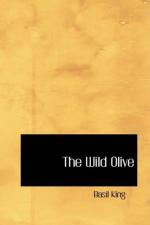Finding the lack of popularity a safeguard not only against prying curiosity, but against inadvertent self-betrayal, it was with some misgiving that he saw his hermit-like seclusion threatened, as he rose higher in the business and consequently in the social—scale. In the English-speaking colony of Buenos Aires the one advance is likely to bring about the other—especially in the case of a good-looking young man, evidently bound to make his mark, and apparently of respectable antecedents. The first menace of danger had come from Mr. Jarrott himself, who had unexpectedly invited his intelligent employee to lunch with him at a club, in order to talk over a commission with which Strange was to be intrusted. On this occasion he was able to stammer his way out of the invitation; but when later, Mr. Skinner, the second partner, made a like proposal, he was caught without an excuse, being obliged, with some confusion, to eat his meal in a fashionable restaurant in the Calle Florida. Oddly enough, both his refusal on the one occasion and his acceptance on the other obtained him credit with his elders and superiors, as a modest young fellow, too shy to seize an honor, and embarrassed when it was thrust upon him.
To Strange both occurrences were so alarming that he put himself into a daily attitude of defence, fearing similar attack from Mr. Martin, the third member of the firm. He, however, made no sign; and the bomb was thrown by his wife. It came in the shape of a card informing Mr. Strange that on a certain evening, a few weeks hence, Mrs. Martin would be at home, at her residence in Hurlingham. It was briefly indicated that there would be dancing, and he was requested to answer if he pleased. The general information being engraved, his particular name was written in a free bold hand, which he took to be that of one of the daughters of the family.
Though he did his best to keep his head, there was everything in that bit of pasteboard to throw him into a state of something like excitement. Not only were the doors of the world Norrie Ford had known being thrown open to Herbert Strange, but the one was being moved by the same thrill—the thrill of the feminine—that had been so powerful with the other. He was growing more susceptible to it in proportion as it seemed forbidden—just as a man in a desert island may dream of the delights of wine.
He had looked at the Misses Martin, but had never supposed they could fling a glance at him. He had seen them at the public gathering-places—in their box at the opera, in the grand stand at the Jockey Club, in their carriage at Palermo or in the Florida. They were handsome girls—blonde and dashing—whose New York air was in pleasant contrast to the graceful indolence or stolid repose of the dark-eyed ladies of the Argentine, too heavily bejewelled and too consciously dressed according to the Paris mode. Strange said of the Misses Martin, as he had said of Wild Olive, that they were “not his type of girl”—but they were girls—they were American girls—they were bright, lively girls, representing the very poetry and romance of the world that had turned him out.




